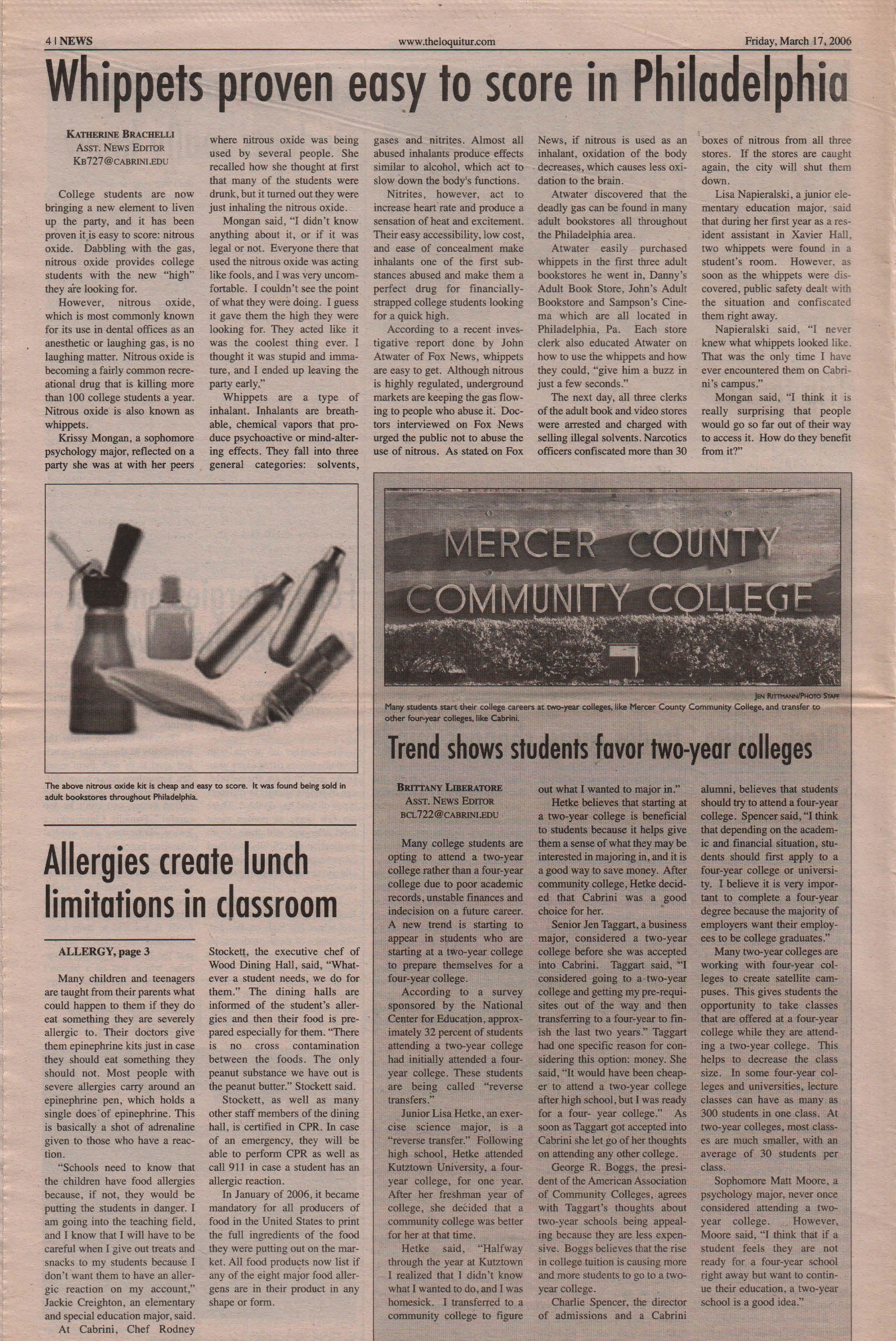
3 minute read
Trendshowsstudentsfavortwo-yearcolleges
out what I wantedto major in."
Allergiescreatelunch limitationsinclassroom
Advertisement
ALLERGY,page 3
Many children and teenagers are taught from their parents what could happen to them if they do eat something they are severely allergic to. Their doctors give them epinephrine kits just in case they should eat something they should not. Most people with severe allergies carry around an epinephrine pen, which holds a single does· of epinephrine. This is basically a shot of adrenaline given to those who have a reaction.
"Schools need to know that the children have food allergies because, if not, they would be putting the students in danger. I am going into the teaching field, and I know that I will have to be careful when I give out treats and snacks to my students because I don't want them to have an allergic reaction on my account,"
Jackie Creighton, an elementary and special education major, said.
At Cabrini, Chef Rodney
Stockett, the executive chef of Wood Dining Hall, said, "Whatever a student needs, we do for them." The dining halls ar~ informed of the student's allergies and then their food is prepared especially for them. "There is no cross contamination between the foods. The only peanut substance we have out is the peanut butter." Stockett said.
Stockett, as well as many other staff members of the dining hall, is certified in CPR. In case of an emergency, they will be able to perform CPR as well as call 911 in case a student has an allergic reaction.
In January of 2006, it became mandatory for all producers of food in the United States to print the full ingredients of the food they were putting out on the market. All food products now list if any of the eight major food allergens are in their product in any shape or form.
Many college students are opting to attend a two-year college rather than a four-year college due to poor academic records, unstable finances and indecision on a future career. A new trend is starting to appear in students who are starting at a two-year college to prepare themselves for a four-year college.
According to a survey sponsored by the National Center for Education, approximately 32 percent of students attending a two-year college had initially attended a fouryear college. These students are being called "reverse transfers."
Junior Lisa Hetke, an exercise science major, is a "reverse transfer." Following high school, Hetke attended Kutztown University, a fouryear college, for one year. After her freshman year of college, she decided that a community college was better for her at that time.
Hetke said, "Halfway through the year at Kutztown I realized that I dido 't know what I wanted to do, and I was homesick. I transferred to a community college to figure
Hetk:ebelieves that starting at a two-year college is beneficial to students because it helps give them a sense of what they may be interested in majoring in, and it is a good way to save money. After community college, Hetk:edecided that Cabrini was a good choice for her. •
Senior Jen Taggart, a business major, considered a two-year college before she was accepted into Cabrini. Taggart said, "I considered going to a two-year college and getting my pre-requisites out of the way and then transferring to a four-year to finish the last two years." Taggart had one specific reason for considering this option: money.She said, "It would have been cheaper to attend a two-year college after high school, but I was ready for a four- year college." As soon as Taggart got accepted into Cabrini she let go of her thoughts on attending any other college.
George R. Boggs, the president of the American Association of Community Colleges, agrees with Taggart's thoughts about two-year schools being appealing because they are less expensive. Boggs believes that the rise in college tuition is causing more and more studen~ to go to a twoyear college.
Charlie Spencer, the director of admissions and a Cabrini alumni, believes that students should try to attend a four-year college. Spencer said, "I think that depending on the academic and financial situation, students should first apply to a four~year college or university. I believe it is very important to complete a four-year degree because the majority of employers want their employees to be college graduates."
Many two-year colleges are working with four-year colleges to create satellite campuses. This gives students the opportunity to take classes that are offered at a four-year college while they are attending a two-year college. This helps to decrease the class size. ln some four-year colleges and universities, lecture classes can have as many as 300 students in one class. At two-year colleges, most classes are much smaller, with an average of 30 students per class.
Sophomore Matt Moore, a psychology major, never once considered attending a twoyear college. However, Moore said, "I think that if a student feels they are not ready for a four-year school right away but want to continue their education, a two-year school is a good idea."







